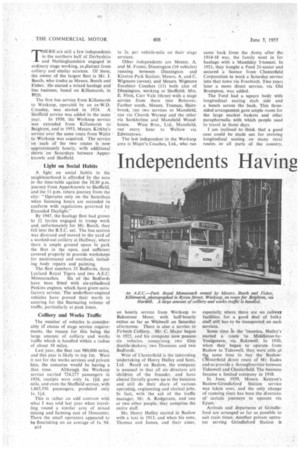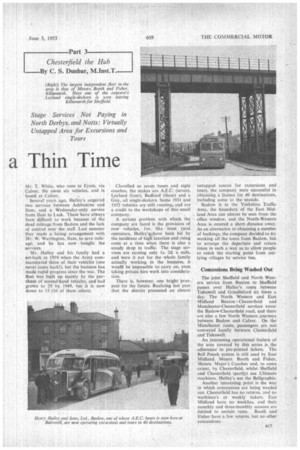Independents Having
Page 48

Page 49

If you've noticed an error in this article please click here to report it so we can fix it.
a Thin Time THERE are still a few independents in the northern half of Derbyshire and Nottinghamshire engaged in ordinary stage working, as,distinct from colliery and similar services. Of these, the owner of the largest fleet is Mr. J. Booth, who trades as Messrs_ Booth and Fisher. He started a mixed haulage and bus business, based on Killamarsh, in 1920.
The first bus service from Killamarsh to Worksop, operated by an ex-W.D. Crossley, . was started in 1924. A 'Sheffield service was added in the same year. In 1950, the Worksop service was extended from Killamarsh to Beighton, and in 1953, Messrs. Kirkby's service.over the same route from WaleS .to Worksop was acquired. The service on each Of the two routes is now approximately hourly, with additional shorts on Saturdays between Apperknowle and Sheffield.
Light on Social Habits
A light on social habits in the neighbourhood is afforded by the note in the time-table against the 10.30 p.m. journey from Apperknowle to Sheffield, and the 11 p.m. return journey from the city: "Operates only on the Saturdays when licensing hours are extended to conform with regulations governed by Extended Daylight."
By 1947, the haulage fleet had grown to 12 lorries engaged in tramp work and. unfortunately for Mr. Booth, they fell into the B.T.C. net. The bus section was divorced and moved to the yard of a worked-out colliery at Halfway, where there is ample ground space to park the fleet in the open, and sufficient covered property to provide workshops for maintenance and overhaul, including body repairs and painting.
The fleet numbers 31 I3edfords, three Leyland Royal Tigers and two A.E.C.
Mon ocoaches, Six of the Bedfords have been fitted with six-cylindered Perkins engines, which have given satisfactory-service. The underfloor-engined vehicles have proved their worth in catering for the fluctuating volumc of traffic, particularly at peak times.
Colliery and Works Traffic The number of vehicles is. considerably ill excess of stage service requirements, the reason for this being the large amount of colliery and works traffic which is handled within a radius of about 10 miles.
Last year, the fleet ran 980,000 miles, and this year is likely to top im. Were it not for the works services and private hire, the concerns would be having a thin time. Although the Worksop service carried 724,277 passengers in 1954, receipts were only Is. la per mile, and even the Sheffield service, with 1,065,556 passengers, produced only Is. 5-1-d. • This is rather art odd contrast with what I was told last year when travelling round a similar area of mixed mining and farming east of Doncaster. There the small operators appeared to be flourishing on an average of Is. 9d. to 2s. per vehicle-mile on their stage services.
Other independents are Messrs. A. and M. Foster, Dinnington (10 vehicles) running between Dinniagton and Kiveton Park Station; Messrs. A. and C. Wigmore (seven), and Messrs. Wigmore Excelsior Coaches (II) both also of Dinnington, working to Sheffield; Mrs. E. Flint., Carr Vale (three) with a stage service from there into Bolsover. Farther south, Messrs. Truman, Shirebrook, run two services to Mansfield, one via Church Warsop and the other via Sookholme and Mansfield Wood
house. Wass Bros„ Ltd., Mansfield, run every hour to Wellow via Edwinstowe.
The last independent in the Worksop area is Major's Coaches, Ltd., who run
an hourly service from Worksop to Bakestone Moor, with half-hourly extras as far as Whitwell on Saturday afternoons. There is also a service to Firbech Colliery. Mr. C. Major began in 1922, and his company now possess six vehicles, comprising two Guy double-deckers, two bennises and two Bedforcis.
West of Chesterfield is the interesting undertaking of Henry Flulley and Sons, Ltd. Based on Baslow, the company is unusual in that all six directors are children of the founder, and have almost literally grown up in the business and still do their share of various operating, engineering and clerical jobs. In fact, with the aid of the traffic manager. Mr. A. Rodgerson, and one or two other people, they comprise the entire staff.
Mr. Henry Hulley started in Baslow with a taxi in 1913, and when his sons, Thomas and James, and their sister, came back from the Army after the 1914-18 war, the family went in for haulage with a Matidslay 5-tonner. In 1921, they bought a Ford 21-seater and secured a licence from Chesterfield Corporation to work a Saturday service into that town via Freehirch. Two years later a more direct service, via Old Brampton, was added.
The Ford had a square body with longitudinal seating each side and a bench across the back. This threesided arrangement gave ample room for the large market baskets and other paraphernalia with which people used to travel in those days.
I am inclined to think that a good case could be made out for reviving longitudinal seating on many rural routes in' all parts of the country,
especially where there are no railway facilities, for a good deal of bulky stuff still has to be transported on such services.
Some time hi the 'twenties, Hulley's started a route to Middleton-byYoulgreave; via Bakewell. In 1930, when they began to operate from Baslow to Tideswell, they were able at same time to buy the Saslow terfield direct route of Mr. Eades and so provide a through.service between Tideswell and Chesterfield. The business became a limited company in 1938.
In June, 1939, Messrs. Kenyon's Baslow-Grindieford Station service was taken over, and the only change of routeing since has been the diversion of certain journeys to operate via Eyam.
Arrivals and departures at Grindieford are arranged as far as possible to suit train times. Another private operator serving Grindleford Station is
Mr. T. White, who runs to Eyam, via Calver. He owns six vehicles, and is based at Calver.
Several years ago, Hulley's acquired two services between Ashbourne and Ilam, and a Wednesday-only service from Ilam to Leek. These have always been difficult to work because of the dead mileage from Baslow and the lack of control over the staff. Last summer they made a hiring arrangement with Mr. W. Warrington, Ilam, to save mileage, and he has now bought the services.
Mr. Hulley and his family had a set-back in 1939 when the Army commandeered three of their vehicles (one never came back!), but the business has made rapid progress since the war. The fleet was built up mainly by the purchase of second-hand vehicles, and had grown to 29 by 1949, but it is now down to 15 (10 of them oilers). Classified as seven buses and eight coaches, the makes are A.E.C. (seven), Leyland (four), Bedford (throe) and a Guy, all single-deckers. Some 1931 and 1933 vehicles are still running,. and are a credit to the workshops of this small company.
A serious problem with which the company are faced is the provision of new vehicles, for, like most rural operators, Hulley's..have been hit by the incidence of high taxation and rising costs at a time when there is also a steady drop in traffic. The stage services are earning only Is. 2d. a mile, and were it not for the whole family actually working in the business, it would be impossible to carry on, even taking private hire work into consideration.
There is, however, one bright Orospect for the future. Realizing last year that the district presented an almost untapped source for excursions and tours, the company were successful in obtaining a licence for 40 destinations, including some to the seaside.
Baslow is in the Yorkshire Traffic Area, the boundary of the East Midland Area can almost be seen from the office window, and the North-Western Area is entered a short distance away. As an alternative to obtaining a number of backings, the company decided to try working all the tours from Baslow, but to arrange the departure and return times in such a way as to allow people to reach the starting point from outlying villages by service bus.
Concessions Being Washed Out The joint Sheffield and North Western service from Buxton to Sheffield passes over Hulley's route between Tideswell and Grindleford six times a day. The North Western and East Midland Buxton Chesterfield and Manchester-Chesterfield services cover the Baslow-Chesterfield road, and there are also a few North Western journeys between Baslow and C.alver. On the Manchester route, passengers are not conveyed locally between Chesterfield and Tideswell.
An interesting operational feature of the area covered by this series is the adherence to pre-printed tickets. The Bell Punch system is still used by East Midland, Messrs. Booth and Fisher, Messrs. Major's Coaches and, to some extent, by Chesterfield, whilst Sheffield and Chesterfield (partly) use Ultimate machines. Hulley's use the Bellgraphic.
Another interesting point is the way in which concessions are being weeded out. Chesterfield has no returns, and no workmen's or weekly tickets. East Midland have no weeklies, and their monthly and three-monthly seasons are limited to certain rates. Booth and Fisher have a few returns, but no other concessions.




































































































